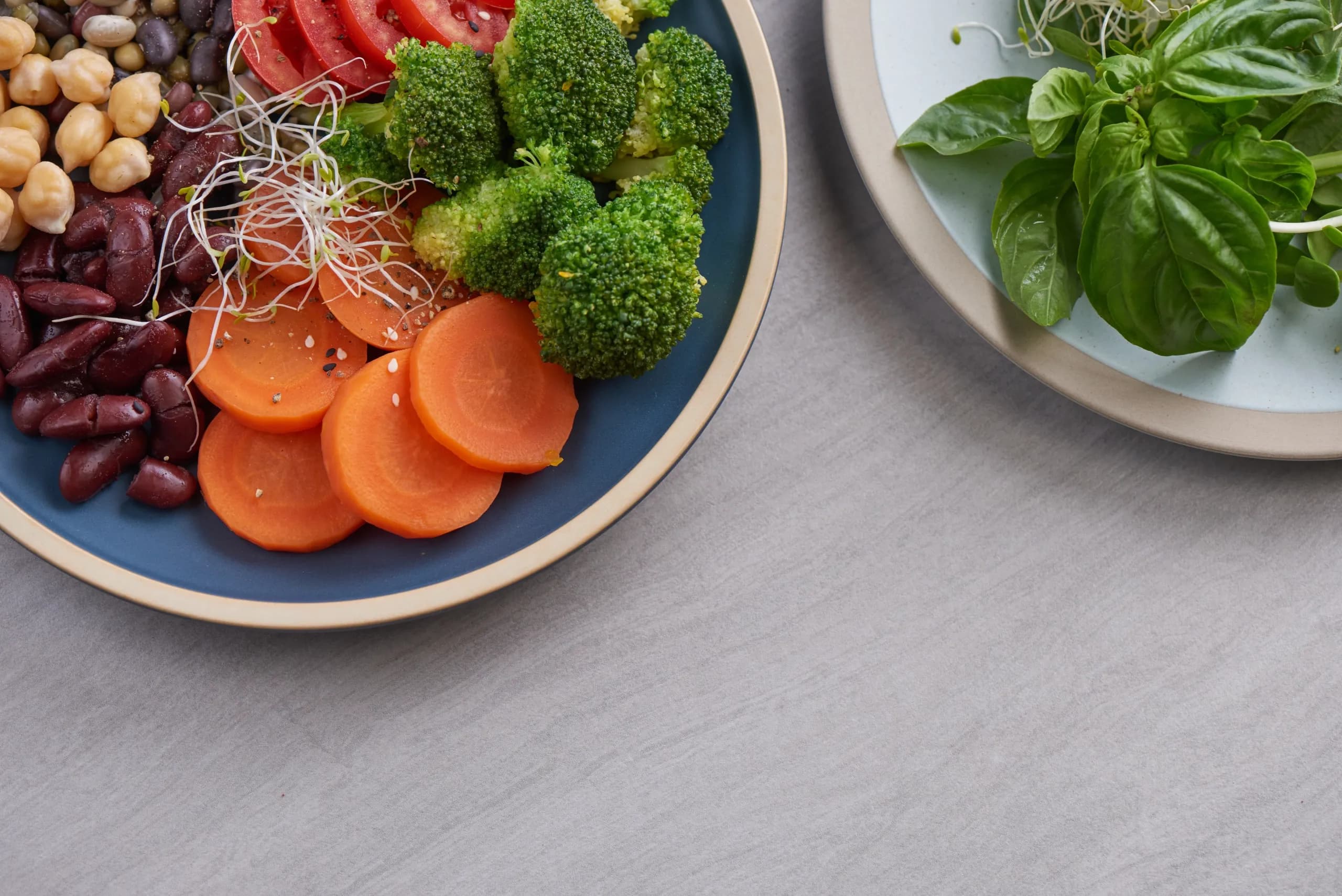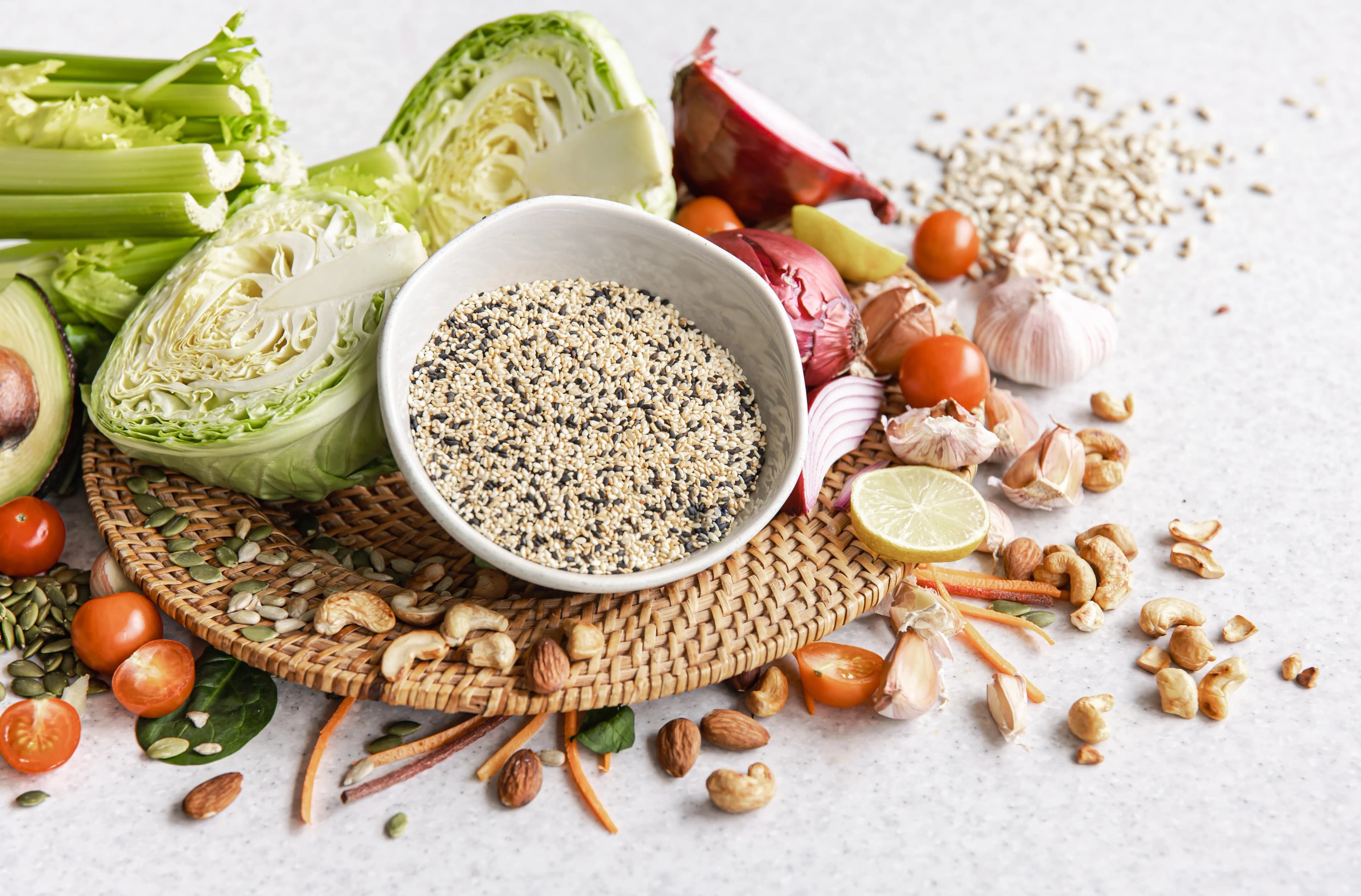
2025-08-11
|
Nutrition
Discover how to create a complete and balanced diet based on plant-based foods. Practical tips, a sample daily menu, and secrets to balanced nutrition for optimal health and energy, all supported by scientific research.
Your daily diet is the foundation upon which your health, energy, and overall well-being are built. When the body receives all the necessary nutrients in the correct proportions, you experience a natural lightness, clarity of thought, inner harmony, and an increased level of vital energy throughout the day, leading to overall improved health, stabilized bodily functions, and a reduced risk of chronic diseases.
Today, an increasing number of people are discovering the benefits of plant-based nutrition. Research from the National Institutes of Health has demonstrated that individuals adhering to a low-fat, plant-based diet consumed 550-700 fewer calories daily, without a corresponding increase in hunger or reduction in meal satisfaction. This approach is gaining popularity due to its scientifically validated advantages: plant-based foods are naturally abundant in fiber, antioxidants, vitamins, and minerals, while containing lower levels of saturated fats.
A well-planned plant-based diet is a simple and accessible way to care for your health. It helps improve well-being, maintain stable energy levels throughout the day, and reduce the risk of developing chronic diseases. This guide provides a practical example of a balanced daily menu that fully satisfies the body's nutritional needs.
Creating a balanced plant-based diet is based on the correct combination of proteins, fats, and carbohydrates without the use of animal products. Plant cuisine offers high-quality protein sources: legumes (lentils, chickpeas, beans), nuts, seeds, pseudograins (quinoa, amaranth), and whole grains. By combining different plant proteins throughout the day, you can easily provide your body with all nine essential amino acids that the body cannot synthesize on its own: histidine, isoleucine, leucine, lysine, methionine, phenylalanine, threonine, tryptophan, and valine.
You can get healthy fats from avocados, nuts, seeds, and cold-pressed plant oils. Researchers at Harvard found that the Portfolio Diet, created by British researcher David J. Jenkins, which includes plant proteins, nuts, seeds, and avocados, reduces the risk of heart disease and stroke by 14%. Pay special attention to omega-3 fatty acids from flaxseeds, chia seeds, and walnuts, which support cardiovascular health.
The diversity of the diet is the second key principle. Include seasonal and local products of various colors: green leafy vegetables are rich in chlorophyll and folic acid, red tomatoes contain lycopene - a powerful antioxidant, purple eggplants provide anthocyanins that protect cells from damage, and orange carrots supply beta-carotene to support vision and immunity.

It's easy to plan a whole menu of plant-based foods if you understand the basic principles. The best plan includes three main meals and 1-2 snacks to make sure you have enough energy all day.
For a complete protein profile, combine legumes (beans, lentils, and soybeans) with grains. For example, rice with beans, buckwheat with peas, and quinoa with chickpeas. These combinations give the body all the essential amino acids it needs to build and repair tissue, make enzymes, and support the immune system.
Breakfast: Oatmeal with banana, walnuts, and chia seeds. Add a tablespoon of ground flaxseed to increase your omega-3 fatty acid intake.
Second breakfast: A green smoothie made with spinach, pineapple, and banana, or a handful of almonds with an apple.
Lunch: A serving of quinoa with spiced baked chickpeas, fresh vegetables, avocado, and homemade hummus. This combination provides complete protein and healthy monounsaturated and polyunsaturated fats.
Snack: An apple with natural peanut butter or a mixture of nuts and dried fruit.
Dinner: Vegetable stew with lentils served with buckwheat or brown rice. Use seasonal vegetables such as zucchini, eggplant, carrots, and onions. Add fresh herbs and high-quality, cold-pressed olive oil.
This diet provides the body with all the necessary macronutrients (proteins, fats, and carbohydrates) and micronutrients (vitamins, minerals, and antioxidants). It maintains stable energy levels and promotes healthy digestion thanks to its high fiber content.
Here is an example of a daily menu from the Organica restaurant:
Breakfast: Sweet Tofu Pancakes Made with tofu, banana purée, and plant-based cream. Sweetened with agave syrup.
Second Breakfast: Fresh Start shot. It's a mix of fresh cucumber, celery, apple, lime, and kiwi.
Lunch: Protein-rich lentil cream soup made with red lentils, carrots, potatoes, celery root, and parsley. Whole grain toast with organic avocado and olive oil.
Snack: Chia pudding made with plant milk, chia seeds, and agar-agar. There are three layers: one with blueberry gel, one with pudding, and one with mango gel.
Dinner: A serving of brown rice with tempeh steak and grilled vegetables, including avocado, zucchini, baby carrots, broccoli, and Kalamata olives.
The most frequent mistake is insufficient protein intake. Include a protein-rich source in every meal, such as legumes, nuts, seeds, tofu, or tempeh. Proper planning ensures you get 0.8–1.2 grams of protein per kilogram of body weight daily.
The second issue is a deficiency in vitamin B12, omega-3 fatty acids, iron, and zinc. Combine iron with vitamin C (from citrus fruits, berries, or bell peppers) for better absorption.
The third mistake is overconsumption of plant-based processed foods and snacks. Ready-made plant products often contain excessive amounts of salt, sugar, and artificial additives. The foundation of your diet should consist of whole, minimally processed foods: fresh vegetables and fruits, legumes, whole grains, nuts, and seeds.

Vitamin B12 is an essential supplement for a plant-based diet, as its deficiency can lead to anemia and neurological disorders. Take 250 µg daily or 2,500 µg weekly, or consume fortified foods such as plant-based milks, nutritional yeast, and some cereals.
For omega-3 fatty acids, use flaxseed oil, chia seeds, and walnuts. If necessary, consider supplements derived from seaweed, which contain EPA and DHA—the active forms of omega-3.
Obtain vitamin D through moderate sun exposure (15–30 minutes daily) or from natural sources such as chanterelle mushrooms, which are among the few plant foods containing this important vitamin. Iodine can be sourced from seaweed or iodized salt. Calcium is found in green leafy vegetables (broccoli, kale), almonds, sesame seeds, and fortified plant-based drinks.
Consume 2-2.5 liters of fluids daily, and increase this amount during active lifestyles or in hot weather. Adequate hydration is especially important with a plant-based diet high in fiber for normal digestion and preventing constipation.
Alternatives to water include herbal teas with antioxidant properties, such as chamomile for calming the nervous system, mint for improving digestion, and ginger for stimulating metabolism; water with lemon for extra vitamin C; and cucumber and mint infusions for refreshment. Reduce the concentration of natural sugars in fresh juices by diluting them with water at a 1:1 ratio.
NIH research found that participants on a low-fat, plant-based diet consumed significantly fewer calories each day without experiencing any difference in hunger or satisfaction from food. Importantly, only the plant-based diet led to a significant loss of body fat.
A Stanford twin study showed the greatest improvements during the first four weeks after changing diets. Participants following a plant-based diet had significantly lower levels of harmful cholesterol (LDL), insulin, and body weight—all indicators associated with improved cardiovascular health.
CDC research also confirms the positive effects of a plant-based diet on children: increasing fruit and vegetable intake among overweight children reduced their body mass index from the 95.6th percentile to the 73.1st percentile.

Lower saturated fats — reduce levels of harmful cholesterol and the risk of cardiovascular diseases, improve blood circulation, and lower blood pressure. Higher fiber content — normalizes digestive system function, supports a healthy gut microbiome, slows sugar absorption, and promotes prolonged feelings of fullness. High antioxidant content — protects cells from free radicals, slows aging processes, reduces chronic inflammation in the body, and supports the immune system.
Participants in scientific studies report increased energy just a few weeks after switching to a plant-based diet, improved skin condition due to vitamins and antioxidants, better sleep, and an overall sense of lightness. A properly planned plant-based diet ensures optimal functioning of all body systems and supports a high quality of life.
A plant-based diet is a scientifically proven approach to a healthy lifestyle, supported by numerous studies from leading medical institutions worldwide. With proper planning, such a diet provides the body with all the essential nutrients and significantly improves health indicators.
Start the transition gradually: add more vegetables and fruits to your usual meals, experiment with new plant-based proteins, and explore a variety of flavors and textures. Enjoy the process of creating nutritious and tasty dishes that provide energy and support your health